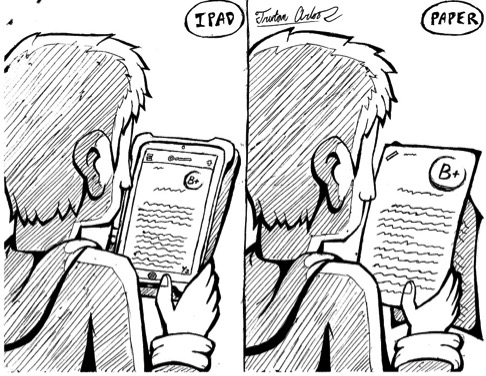iPads: for better, for worse?
October 2, 2015
Glenbard District 87 began its Instructional Technology Strategic Plan with many aspirations towards enhancing student learning and developing a “hands-on learning environment” by allowing students to access information through mobile devices. Now almost two years have passed since the first iPad implementation at Glenbard South, and one must wonder if the district’s dream has become a reality. Even though Glenbard South has effectively established iPads as learning tools within the classroom, they still have yet to master their incorporation into the common curriculum.
Currently, the Assistant Principal for Operations, James Cuny, and the Instructional Technology Specialist, Stephanie Wallace, head the iPad implementation process at Glenbard South. Both agreed that glitches have been inevitable with such a drastic learning adjustment. Particularly, problems have resided in the adaptation of students and teachers using iPads as a tool of learning instead of a social tool for entertainment. “What we have learned from other schools,” Cuny said, “is that it was not until year three and four that they [teachers] really got good at managing iPads.”
Yet without proper management, the entire purpose of using iPads as learning tools has seemed redundant, for students can hardly be empowered to pursue their own learning without absolute and constant guidance within the classroom.
In theory, these problems could very well be solved within a matter of a few years, but, during this time of learning and revision, one could only hope that Glenbard South students will be receiving the same educational caliber as they did with printed textbooks, if not better. Although the quality of education with iPads has been identified as a top priority by Technology Specialist, Stephanie Wallace, the most crucial thing has been “professional development for teachers,” Wallace said.
According to Wallace, “Teachers have training, go to ‘lunch and learn’ sessions, receive training on Institute days, and are provided with many online resources.”
There had also been the issue of educational preference– the choice between printed textbooks and digital textbooks– which could affect testing scores. However, Glenbard District 87 has completed various pilot programs that have shown iPad implementation actually increases academic performance among students. Specifically scores increased by an average of 6% within the Glenbard East Freshman Academy 2012-2013 pilot program for English language learner curriculum. Even though, the majority of these pilot programs feature only small sample groups, there has been still little information on the adverse effects of technology based learning.
iPad implementation may come with various uncertainties about the advancement of the student and overall success, but we also must recognize the disadvantage of learning without a keen focus on the usage of technology in this digital age.
































